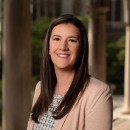Research Office News
Pages
 David Córdova Receives Award for Best Research Article on Family Research and Theory
David Córdova Receives Award for Best Research Article on Family Research and TheoryAssociate Professor David Córdova and co-authors received the Reuben Hill Award from the National Council on Family Relations. The award is presented for the best research article that makes substantial and significant contributions to family research and theory.
- September 9, 2020
- Learn more »
- Natasha Johnson, PhD ‘20 Receives a Racial Injustice Award From the U-M Depression Center
Natasha Johnson, PhD ‘20, has received a $5,000 Racial Injustice Award From the U-M Depression Center for her research on racism awareness among Black youths. Her research has the potential to provide empirical support for intervention programs aimed at combating racism by developing a psychometric tool that will evaluate resilient pathways for racially marginalized youth.
- August 24, 2020
- Learn more »
 Undocumented Parents Teach Latino Kids to be Overly Cautious
Undocumented Parents Teach Latino Kids to be Overly CautiousAssistant Professor Fernanda Lima Cross' new research finds that parents who are undocumented immigrants are more likely than documented parents to teach mistrust to their children and to be wary of interactions with law enforcement. "Ethnic-racial socialization is often used to prepare adolescents for life outside of the home and tends to be protective," says Cross.
- August 21, 2020
- Learn more »
 Lindsay Bornheimer Receives NIH Clinical Trial Planning Grant (R34)
Lindsay Bornheimer Receives NIH Clinical Trial Planning Grant (R34)Assistant Professor Lindsay Bornheimer has received a National Institute of Mental Health Clinical Trial Planning Grant (R34). This three-year grant will support her team in modifying and evaluating acceptability and preliminary effectiveness of Cognitive Behavioral Suicide Prevention for psychosis (CBSPp) and will help increase the utility of CBSPp in community mental health work. CBSPp is a promising intervention developed and evaluated by Bornheimer’s collaborative team and is one of few suicide interventions available that is tailored for adults experiencing psychosis.
- August 13, 2020
 How Government Relief Affects Small-Dollar Loans
How Government Relief Affects Small-Dollar LoansAssociate Professor Terri Friedline discusses the drop in demand for small-dollar loans with Morning Consult. Without additional government relief, she expects “things to get a lot worse as people are forced to take on debt, including higher-cost, small-dollar loans, to survive the pandemic.”
- August 4, 2020
- Learn more »
- Center for Equitable Community & Family Well-Being Launches Website
Professor Trina Shanks is the director of the newly launched Center for Equitable Family & Community Well-Being, which is designed to connect the resources and the intellectual strength of U-M with the passion and social capital of community leaders. The center’s work will focus explicitly on improving the well-being of families and communities, and reducing existing inequities.
"When I first conceptualized the Center for Equitable Community & Family Well-Being in the fall of 2019, I was concerned about growing inequality and the economic insecurity faced by many Black and low-income households both in the United States and locally in Southeastern Michigan,” says Shanks. “During this current moment of crisis and uncertainty in the midst of the COVID-19 pandemic, racial protest and economic freefall, the urgency to address equity concerns becomes even more pressing. Although the center is just getting started, we have a few signature projects already underway that hint at how we intend on pursuing our vision to expose oppressive systems and empower families and communities to thrive. Please review our current work and feel free to reach out to anyone on our team with your ideas of how to collaborate on research or interventions that bring greater equity to vulnerable communities and families."
- July 27, 2020
- Learn more »

 New — Level Up Lab Harnesses Technology for Social Good
New — Level Up Lab Harnesses Technology for Social GoodThe School of Social Work announces the Level Up: Employment Skills Simulation Lab, which develops solutions designed to bridge the equity gap in employment opportunities for underserved groups. Associate Professor Matt Smith is the principal investigator. Assistant Professor Jamie Mitchell and JD Smith from Northwestern University are co-investigators.
Learn more about the lab’s mission, research and impact.
- July 6, 2020
- Learn more »
 Hopefulness, Mental Health and Wellness Counseling are Vital for Young Asian American Cancer Survivors
Hopefulness, Mental Health and Wellness Counseling are Vital for Young Asian American Cancer SurvivorsAssistant Professor Anao Zhang talks with the CDC about hopefulness, mental health and wellness counseling for adolescent and young adult cancer survivors.
- July 2, 2020
- Learn more »
 Protests Can be a Powerful Strategy to Enact Change
Protests Can be a Powerful Strategy to Enact ChangeIn light of COVID-19, and ongoing protests in the wake of George Floyd’s death, Professor and Associate Dean of Research Rogério M. Pinto spoke to MLive about both the timing and the power of this moment of unrest. “Protests can be a powerful strategy to enact change, and already the movement has scored some results. That includes having criminal charges filed against all four Minneapolis police officers involved in Floyd’s death and upgrading of charges from third- to second-degree homicide for the officer who knelt on Floyd’s neck. “The simple fact they’ve been charged already is a phenomenal result.”
- June 15, 2020
- Learn more »
 How to Tell if It’s More Than a Bad Mood?
How to Tell if It’s More Than a Bad Mood?Associate Professor Shawna Lee’s research is cited in a New York Times article that discusses how the tremendous changes wrought by the pandemic can mimic, mask or amplify depression-like feelings. According to the research she conducted in April, a third of respondents reported symptoms of depression including fatigue, insomnia and feelings of hopelessness.
- May 26, 2020
- Learn more »